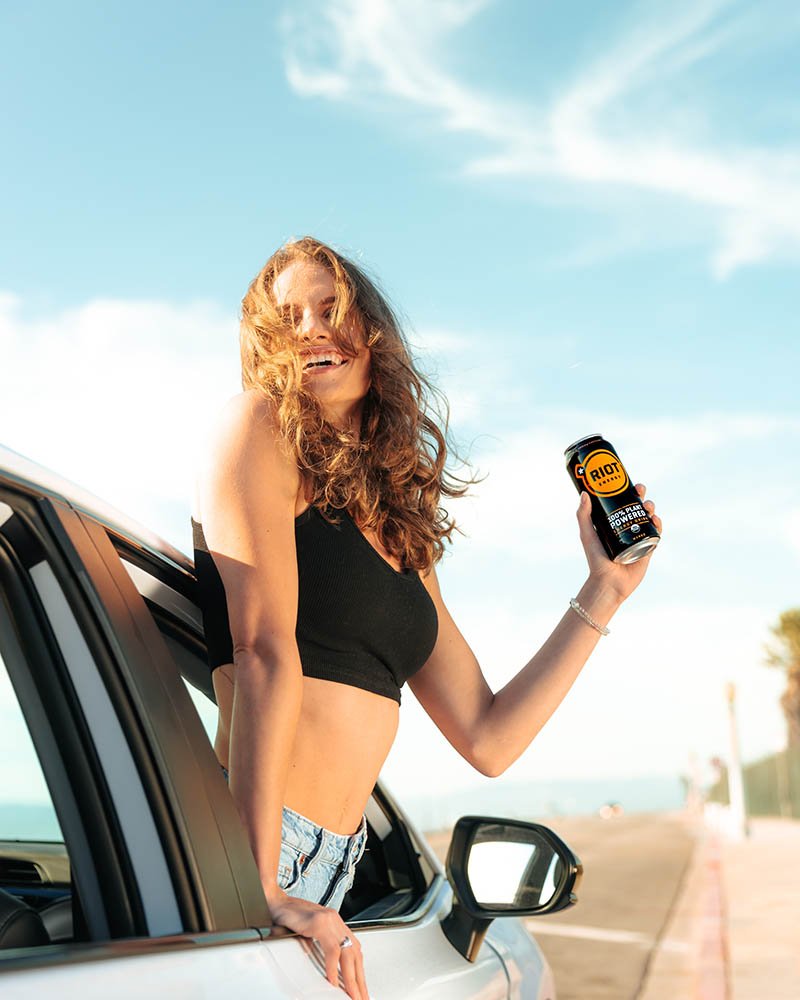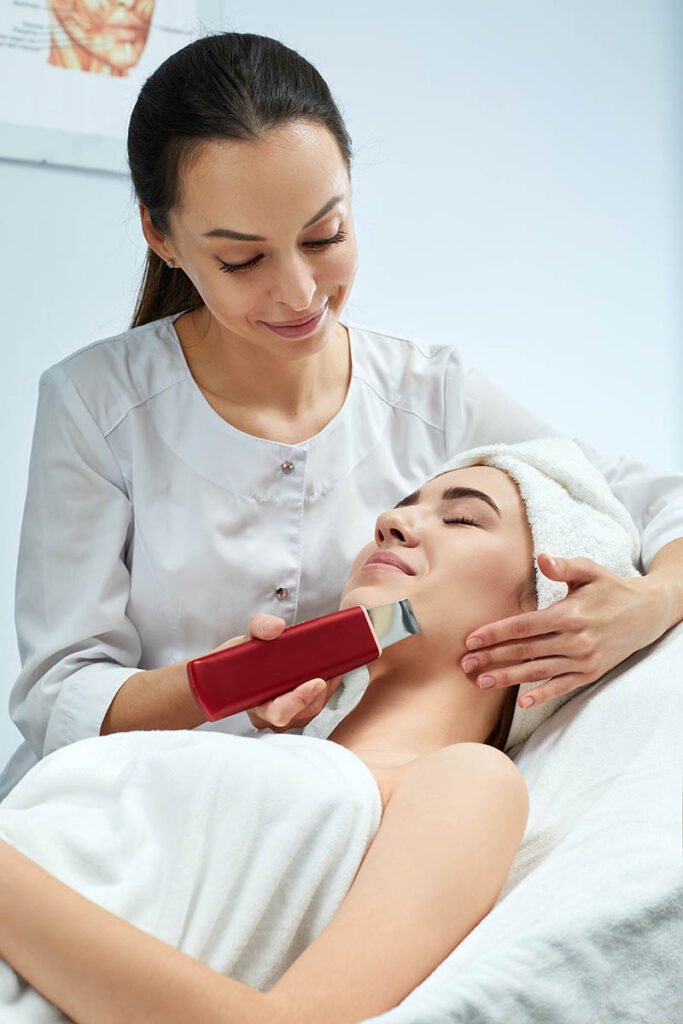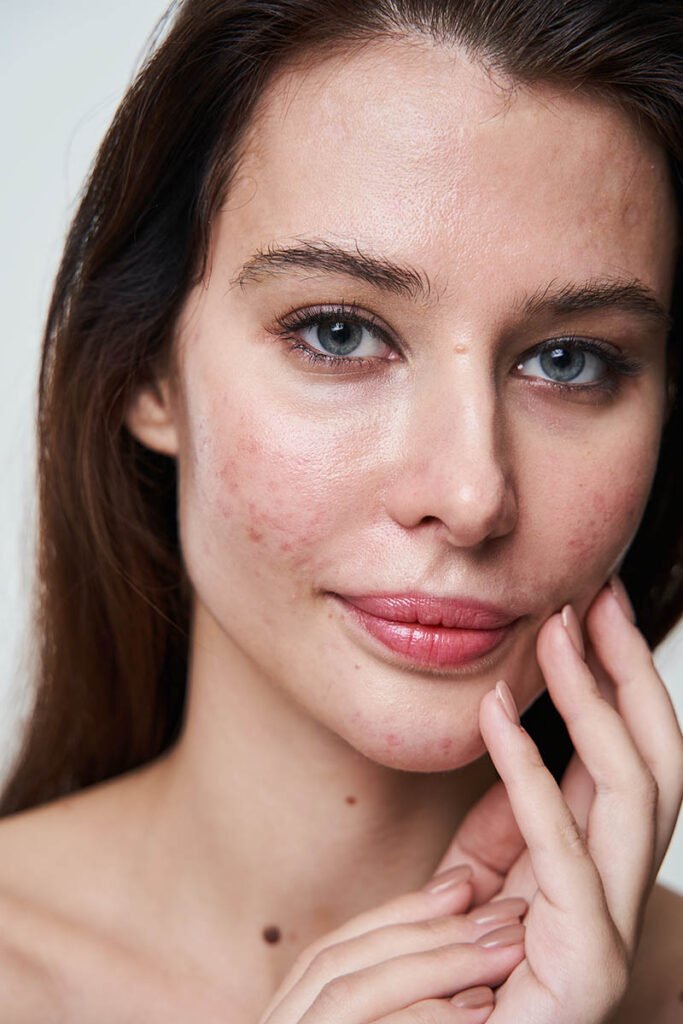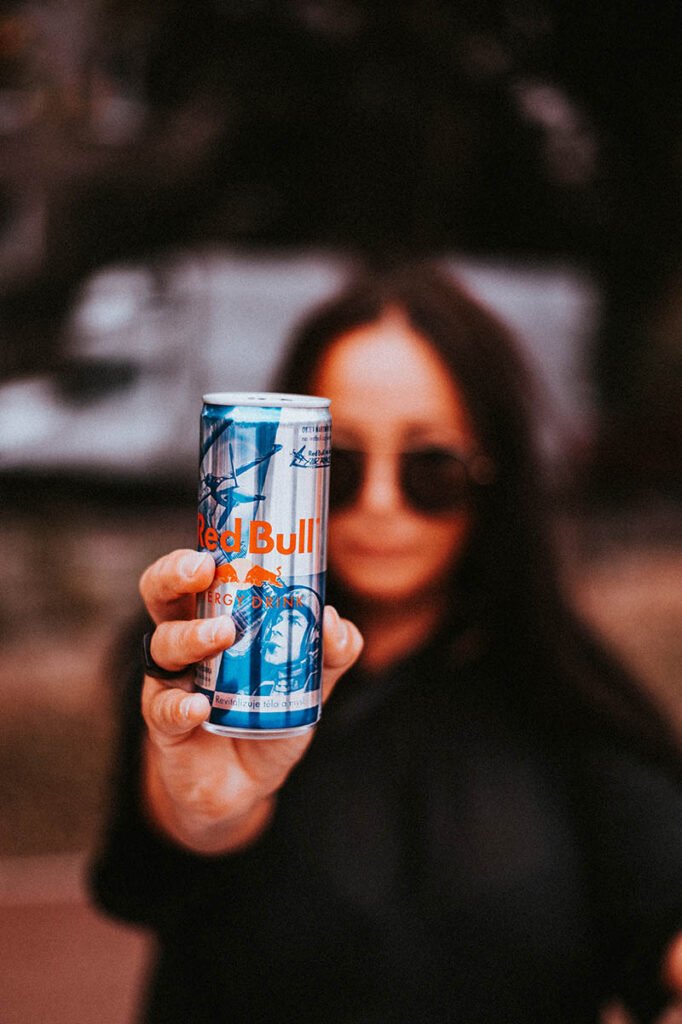Does Energy Drink Cause Acne? What You Should Drink Instead!
Are you a fan of energy drinks? If so, then you’re definitely not alone. These potent liquid pick-me-ups have become incredibly popular among people of all ages, thanks to their ability to provide a quick and powerful burst of energy when you need it most.
However, you might be wondering if there’s a hidden downside to consuming energy drinks, particularly when it comes to your skin. Could your beloved energy drink be the cause of your acne?
In this blog post, we’ll explore the connection between energy drinks and acne, and suggest some healthier alternatives for when you need that energy boost.

What Are Energy Drinks?
Energy drink has become a generic term that encompasses any type of beverage marketed as providing energy. These drinks usually contain sugar, caffeine, and other stimulants like guarana or taurine.
Although energy drinks are popular among athletes and fitness professionals, they’re also consumed by people who don’t necessarily lead an active lifestyle.
For example, a student might drink an energy drink before a big exam to help them stay alert and focused, or an office worker might use one to get through long hours of staring at their computer screen. Or, if you would like to commit a long day working in the garden and you need an additional energy boost, energy drinks might be a desired choice.
Besides commercially branded energy drinks such as Red Bull and Monster, popular beverage brands now offer “energy shots” that are even stronger and more highly caffeinated than regular energy drinks.
They can be found in most convenience stores, and many people favor these energy shots over the more traditional energy drinks because of their higher caffeine content.

What Are the Main Causes of Acne?
Like it or not, we all suffer from acne at some point in our lives. But what causes it? Generally speaking, the main cause of acne is a combination of hormones, bacteria, and excessive sebum production.
If you have an overproduction of oil on your skin, it can clog up your pores and cause bacteria to grow in them, leading to breakouts.
During the puberty years, fluctuating hormones can also cause acne. The hormone testosterone is responsible for the sebum production that leads to clogged pores. This is why teenagers usually suffer from more severe acne than adults.
Stress can also be a contributing factor to your skin breaking out, as it increases the cortisol level in your body and causes an increase in oil production. As a result, the pores on your skin become clogged and prone to acne.
Your diet also plays a role in how healthy your skin looks. Eating too many greasy and processed foods can contribute to breakouts, as well as sugar-filled drinks like sugary sodas or iced teas.
On the other hand, a healthier diet that contains lots of fresh fruits and vegetables can help to reduce the risks of acne breakouts.
If you have ever experienced sleep disruption, you will know that it can also lead to acne. Lack of sleep causes your body to produce more hormones, leading to an increase in oil production and therefore acne breakouts.
Another popular cause of acne any other skin issues is the use of certain cosmetics and skincare products. Many makeup, lotions, and moisturizers contain oil-based ingredients that can clog your pores, leading to breakouts.
In some cases, especially if you have hyper sensitive skin, the water source in your area might be too hard and can cause an increase in skin sensitivity that leads to skin problems. Although it’s a rare cause of acne, it’s still worth considering.

The Connection between Energy Drinks and Acne
If you’re wondering whether your favorite energy drink may cause acne, the answer is not so simple. Although the link between the consumption of energy drinks as well as other caffeinated beverages and acne isn’t well understood at the moment, there is some concrete evidence to suggest that drinking too many of them can lead to acne outbreaks as one of the side effects.
Let’s have a quick look at the main ingredients of energy drinks and their negative impact on the skin:
- Sugar: Many energy drinks have high amounts of sugar content, which is known to contribute to inflammation in the body. Inflammation, in turn, can trigger the production of more sebum, leading to clogged pores and breakouts.
- Caffeine: Energy drinks often contain significant amounts of caffeine. While caffeine itself may not cause acne, it can affect your hormones, particularly cortisol (the stress hormone) and insulin, which can lead to acne flare-ups and inflammation.
- Artificial additives: Artificial sweeteners, colors, and flavors are common in energy drinks. These additives can also contribute to inflammation or allergic reactions that manifest as acne breakouts.
Energy drinks are also known to be dehydrating, as they contain diuretic substances that make your body lose more fluids than it takes in. Dehydration can lead to dry skin, which tends to create the perfect environment for acne-causing bacteria to grow and thrive.

What You Should Drink Instead
If you’re concerned about energy drinks causing acne breakouts, the good news is that there are plenty of healthier alternatives available.
- Water: It might seem obvious, but water is the best way to hydrate your body and keep it functioning properly. Plus, it has no calories or sugar and won’t cause any inflammation or allergic reactions like energy drinks can.
- Water infused with fresh fruit: Citrus fruits, berries, and even cucumber are popular choices for infusing water and can help keep you refreshed and revitalized throughout the day.
- Green tea: Not only is green tea packed with antioxidants that help to protect and heal your skin, but it also contains caffeine that can give you a gentle energy boost without the excessive sugar found in energy drinks. Plus, it has anti-inflammatory properties which can help reduce acne symptoms.
- Herbal teas: Herbal teas like chamomile, peppermint, and ginseng can provide a soothing alternative to energy drinks. Many herbal teas have calming and stress-relieving properties, which can improve your overall well-being and contribute to a clearer complexion.
- Coconut water: With its high potassium and electrolyte content, coconut water can provide a quick pick-me-up without the negative effects associated with energy drinks. As a bonus, it’s also great for hydrating your skin.
- Smoothies: A homemade smoothie made with nutrient-rich ingredients like fruits, vegetables, and protein-packed yogurt can provide a natural and delicious energy boost. Plus, the nutrients in these ingredients can promote a healthy complexion.
All in all, it’s important to be mindful of the kind of drinks you consume and how they can affect your health. While energy drinks may provide a quick pick-me-up, there are healthier alternatives available that won’t harm your skin or overall health.

How to Treat Acne and Breakouts
If you’re already suffering from acne, the first step is to investigate the potential causes so that you can make changes to your lifestyle and diet if needed.
For example, if stress is contributing to your breakouts, reducing or managing it through meditation or exercise can help improve your skin health.
In addition to these lifestyle changes, there are a variety of treatments and products available that can help treat breakouts.
Your dermatologist can also provide advice on the best course of action based on your skin type and the severity of your breakouts.
If you opt for drugstore products, make sure to look for ones that are labeled as being non-comedogenic and oil-free. These products won’t clog your pores and will help keep your skin clean and clear.
Remember, it’s important to be patient when dealing with breakouts. While there are lots of products out there that can help improve the appearance of acne, it can take some time to find the right solution for you.
Try to be gentle with your skin and, above all, don’t give up! With patience and the right products or treatments, you can achieve healthier and clearer-looking skin in no time.

Frequently Asked Questions
Acne and breakouts have never been easy to deal with, but understanding them is the first step. Here are some of the most common questions we get asked about acne and breakouts:
Q: Does coffee cause acne?
A: While coffee may not directly cause acne, it can contribute to dehydration, which has been known to exacerbate the symptoms of existing breakouts.
Also, consuming too much caffeine can lead to higher levels of cortisol in the body, which has been linked to inflammation and skin breakouts.
Q: Do dairy product cause acne?
A: While the jury is still out on this one, some studies have suggested that there may be a link between dairy products and acne.
The hormones found in dairy products can interact with your body’s hormones, leading to increased production of sebum which can contribute to breakouts. So it may be worth avoiding dairy or switch to dairy-free alternatives like almond milk or coconut milk, if you’re prone to acne.
Q: Do other soft drinks cause acne?
A: In general, sugary drink and soda can trigger the same negative reactions as energy drinks, so it’s best to avoid them if you’re worried about breakouts.
However, some recent studies have shown that there may be a link between diet soda and acne due to its high levels of artificial sweeteners.
Therefore, it’s probably best to steer clear of both regular and diet sodas if you’re looking to reduce breakouts.
Q: What vitamins are good for acne?
A: Vitamins A, C, D, E, and B-complex are all essential for healthy skin. Vitamin A can help to regulate the production of sebum and reduce inflammation that may be causing breakouts.
Vitamins C and E are both powerful antioxidants that can help protect your skin from free radical damage, while B vitamins can help reduce stress and improve overall skin health.
Vitamin D is also known to have anti-inflammatory properties which can be beneficial for those suffering from acne.
Taking a daily multivitamin or supplementing with these key vitamins may help to promote clear and healthy skin.
Q: Does washing my face too often cause acne?
A: Over-washing your face can strip it of its natural oils, making it dry and more prone to breakouts. However, washing it once a day with a gentle cleanser should be enough to keep your skin clean and clear.
Also, avoid scrubbing too hard when cleansing as this can aggravate the skin and cause further irritation.
Q: How do I know if my acne is caused by hormones or by my diet?
A: Hormonal acne tends to appear in specific areas of the face such as the forehead, jawline, and chin. It usually starts to appear in early adulthood and is often accompanied by other symptoms such as irregular periods or skin sensitivity.
On the other hand, dietary acne tends to be more widespread and can be triggered by certain foods or drinks that cause inflammation.
Keeping a food journal can help you identify which foods are causing your breakouts so that you can avoid them.
Q: Is it safe to use oil-based skincare products if I have acne?
A: Oil-based products are generally safe to use as long as they’re labeled as being non-comedogenic and free of pore-clogging ingredients. This means that the oils won’t clog your pores or contribute to breakouts.
In fact, certain oils like jojoba and argan can be beneficial for acne-prone skin as they help to soothe inflammation, reduce redness, and hydrate the skin without causing any irritation.
However, it’s still important to be mindful of your skincare routine and ensure that you’re not using too many products simultaneously, as this can lead to further breakouts.
Q: Are there any natural remedies for acne and breakouts?
A: Yes! There are lots of simple at-home treatments you can use to help reduce the appearance of breakouts.
For example, tea tree oil is known for its anti-inflammatory and antibacterial properties, making it a great alternative to harsh chemicals.
Aloe vera is also an effective natural remedy for acne as it helps to reduce inflammation and soothe the skin.
You can also make your own face masks using ingredients like honey, yogurt, or oatmeal which provide gentle exfoliation and help keep your skin clear.
Finally, don’t underestimate the power of a good diet. Eating plenty of fresh fruits and vegetables can help provide your skin with essential nutrients that it needs to stay healthy and free from breakouts.

The Editor’s Note
During my high school years all the way to my late twenties, I struggled with oily skin and, of course, acne — both the physical and mental effects it had on my self-esteem.
It was time of confusion and frustration; I tried everything I could to get rid of my acne, but nothing worked.
It wasn’t until I made significant changes to my lifestyle — reducing stress, eating healthier, and using the right skincare products — that I finally managed to clear up my skin.
I cannot count how many skincare products I’ve tried and changed, how many consults I’ve had with dermatologists, or how many times I’ve felt frustrated and helpless.
Then one day, I opted for an over-the-counter face wash that combined salicylic acid and zinc — two ingredients that work together to reduce redness, swelling, and inflammation.
I used it twice a day on a daily basis for almost a year, and I am proud to say my skin has never been better.
This guide is a combination of all the lessons I’ve learnt over the years. It’s a combination of lifestyle changes, natural remedies, and also patience to help you achieve the beautiful, clear skin you deserve.
I hope this guide helps you on your journey to improved skin health and confidence!
But, as usual, always search for advice from your dermatologist first. Based on your skin conditions issues, they can offer the best diagnosis and advice.
